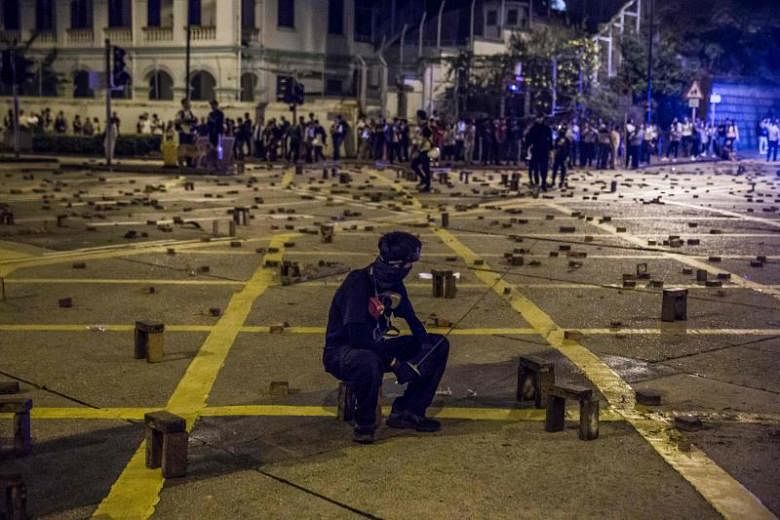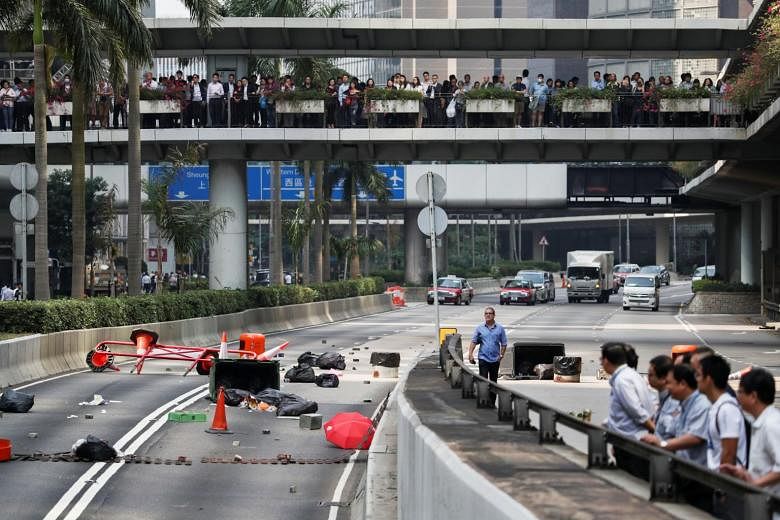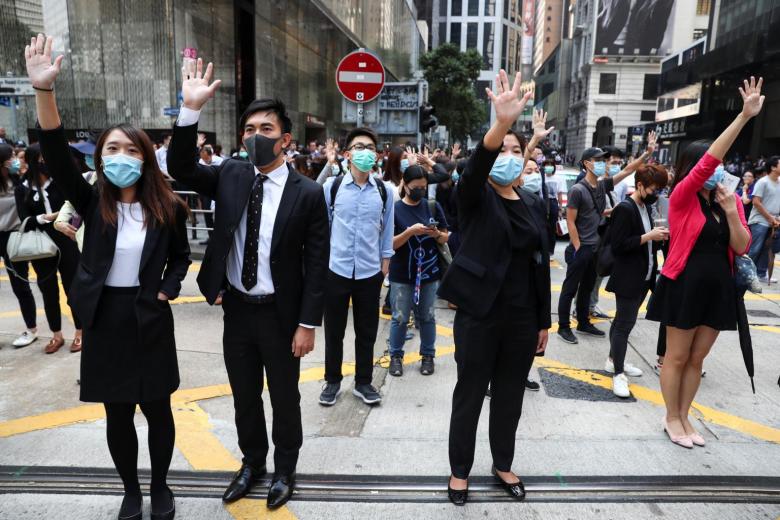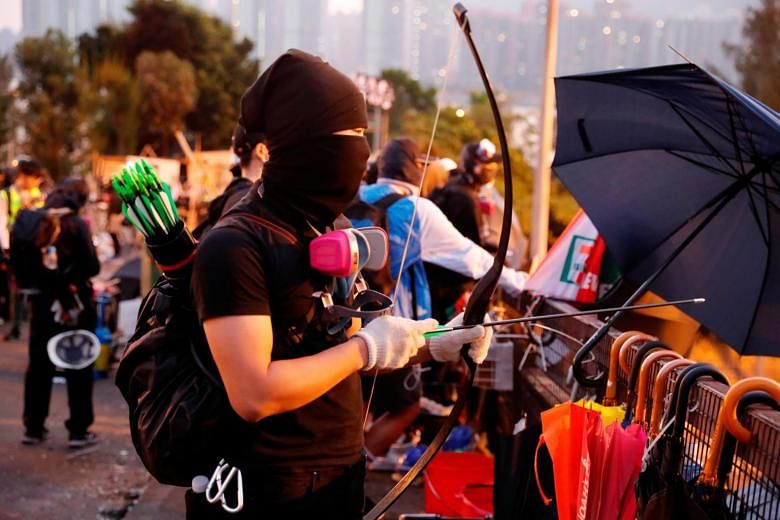HONG KONG (BLOOMBERG, REUTERS) - Schools in Hong Kong have been suspended until Sunday (Nov 17), the Education Bureau announced on Thursday, amid a fourth straight day of chaos as protesters defied the authorities to bring the city to a standstill yet again.
The city's subway operator has partially suspended service and protesters continue to block roads as residents wonder what could come next. The financial hub has been paralysed since Monday morning, when a protester was shot during protests, igniting citywide rallies and violent clashes.
The situation has worsened in the days since, with most major universities cancelling classes and companies telling employees to work from home.
The Education Bureau announced on Thursday that the closure of all kindergartens, primary and secondary schools as well as special schools will be extended to Sunday to ensure the safety of students, local media reported.
The extension announcement came as classes were suspended on Thursday, following widespread public transport disruptions and chaos on the streets since Monday.
On Wednesday morning, the bureau said that parents may decide whether their children should go to school. That drew criticism on the bureau for not shutting schools sooner considering the chaotic situation.
China's state-owned Global Times newspaper tweeted that the Hong Kong government was expected to announce a curfew this weekend amid the unending violence, citing unnamed sources. However, the tweet was deleted shortly afterwards.
"I just checked how the information was obtained. My conclusion is that the information is not sufficient to support this exclusive news. I have demanded to delete the tweet," Global Times editor Hu Xijin tweeted in English.
Meanwhile, black-clad protesters and university students maintained their blockades of major roads, including the entrance to the Cross-Harbour Tunnel that links Hong Kong island to the Kowloon area, and a major highway artery between Kowloon and the rural New Territories. Police fired tear gas near the tunnel early on Thursday to try to clear the protesters.
Thousands of students barricaded themselves inside campuses with makeshift fortifications at several universities, blocking entrances and occupying nearby roads, preparing stockpiles of food, bricks, petrol bombs and other makeshift weapons as they hunkered down for possible clashes with police.
Commuters queued at metro stations across the city after some rail services were suspended and roads closed. Some citizens, dressed in office wear, shouted at riot police who were deployed on station platforms.
The Cross-Harbour Tunnel, a main artery between Kowloon and Hong Kong Island, was blocked after protesters vandalised toll booths.
Meanwhile, Taiwan's Mainland Affairs Council has arranged buses and flights back to the democratically run island for 85 Taiwanese students who attend the Chinese University of Hong Kong (CUHK), council spokesman Chiu Chui-cheng said.
Mr Chiu said that 197 students, including those who arranged their own travel, were expected to return to Taiwan from Hong Kong on Wednesday and that the government would continue to monitor the situation in the city and provide necessary assistance.
There are 1,021 Taiwanese students currently enrolled in universities in Hong Kong. CUHK was the site of fierce clashes between protesters and police on Tuesday.
Police on Thursday said a man dressed in black and aged in his 30s has died in Hong Kong, though it was not clear if his death was related to ongoing protests.
Initial investigations showed that the man fell from a height in the district of Tsing Yi in the New Territories and there were no suspicious circumstances, police said late on Wednesday. Police did not say when the incident happened.
The authorities also said on Thursday that 64 people were injured during Wednesday's clashes, which left two men in critical condition. There were no further details about the injuries they suffered.
Around 10pm on Wednesday, local broadcaster RTHK reported that government officials arrived at Chief Executive Carrie Lam's official residence for a meeting. It wasn't immediately clear what was discussed.
The turmoil marks a shift in intensity in the protests, which had mostly been confined to the weekends, apart from sporadic efforts to disrupt the Monday morning commute.

Hong Kong has seen many violent days since the unrest began in June, but the disruption this week has taken things to a new level - and fears are growing as to what may come next.
Protesters paralysed the city on Wednesday for a third straight day, disrupting subway lines and blocking roads. Tear gas swirled through the Central financial district, while police also battled university students far from the city centre.
A 70-year-old man was in critical condition after being hit by a brick-shaped hard object during scuffles, according to local newspaper Ming Pao.
There are fresh worries about an economy already in recession, with the Hang Seng Index losing 1.8 per cent on Wednesday for its lowest close in three weeks.
"At the 30,000ft level, you're seeing a confluence of rising violence but also dwindling protester numbers," said Mr Kevin Yam, a lawyer, political commentator and member of the Progressive Lawyers Group, which has pushed for greater democracy in Hong Kong.
"If you ask me where this is going to go, I have no idea," he added.
"In many ways, we're in slightly uncharted territory."
Hong Kong's government again sought to reassure residents it could contain the chaos, and called for an end to the violence.
Mrs Lam has repeatedly insisted she won't give in further to protester demands, which include an independent inquiry into police violence and the ability to nominate and elect the city's leaders.
CRITICAL JUNCTURE
In Beijing, state-run media ratcheted up the rhetoric. Hong Kong is at "the most critical juncture", as violent acts of "black-clad rioters" come close to terrorism, the official Xinhua News Agency said in a commentary.
The Global Times hinted in a Wednesday commentary that the central government could employ "direct intervention" under the Basic Law it uses to govern Hong Kong.
"The rioters' rampage is a short drive from the nearest outpost of the Shenzhen Armed Police Force and a short walk from the People's Liberation Army in Hong Kong," it said.
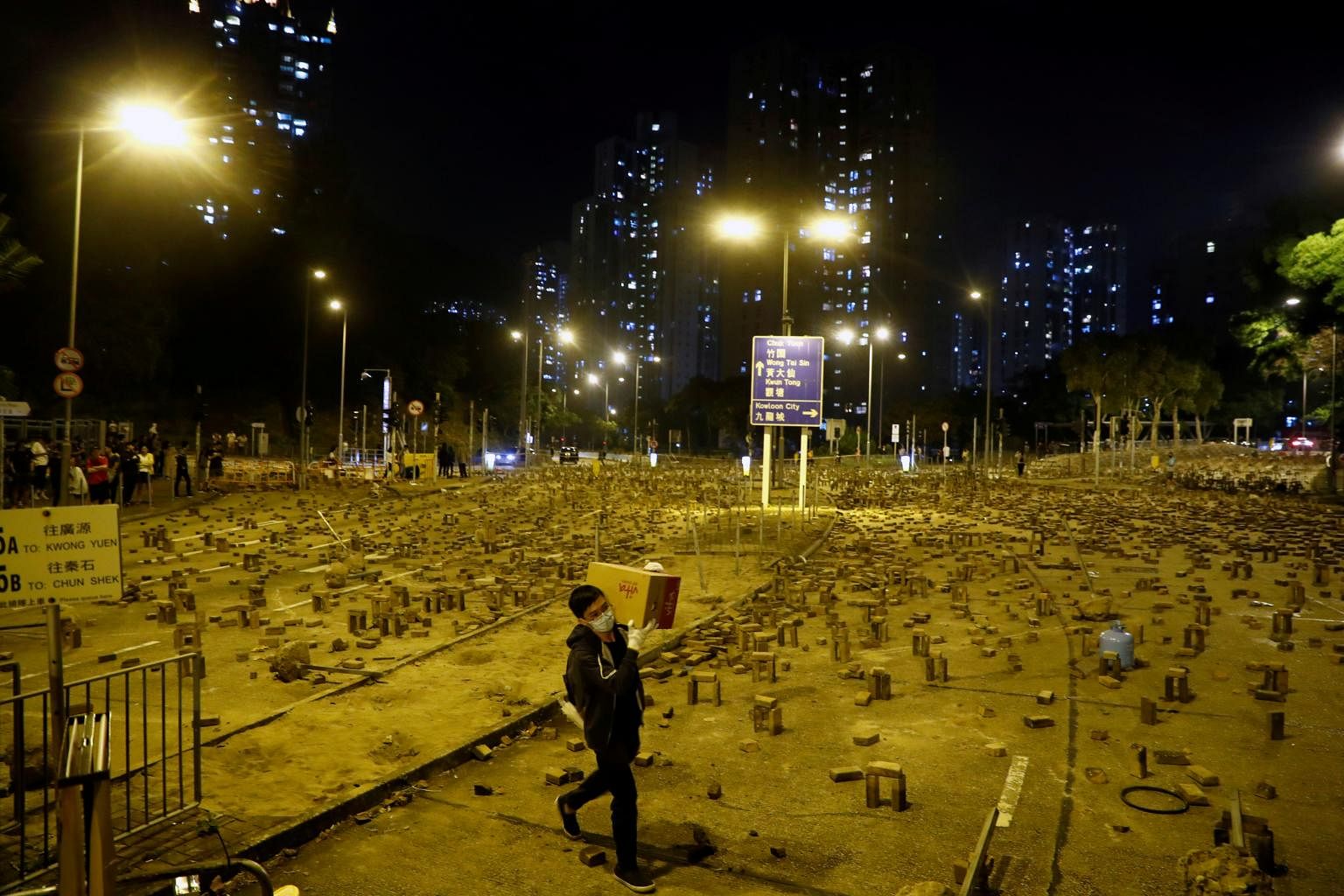
Yet while fears of a Chinese intervention have long persisted since the demonstrations began, it's unclear if the situation has reached a tipping point.
Any Chinese troops or police in Hong Kong would raise questions about the city's autonomy, potentially putting at risk US trade privileges at a time when the mainland's economy is struggling.
In the United States on Tuesday, Senate Majority Leader Mitch McConnell vowed to work on legislation supporting pro-democracy protesters in Hong Kong, drawing a rebuke from Beijing.
The Bill would subject the city's special US trading status to annual reviews and provides for sanctions against officials deemed responsible for undermining Hong Kong's "fundamental freedoms and autonomy".
The latest spell of violence in Hong Kong intensified last Friday after a student died of injuries suffered near a police dispersal effort last week - the first fatality linked to protests after months of unrest.
Things got even worse on Monday after a protester was shot by a traffic cop, triggering widespread violence that has continued ever since.
Commuters found themselves stuck again on Wednesday morning as activists disrupted rush-hour traffic in protest against the government's response and police tactics. Services including the entire East Rail Line and parts of the Kwun Tong and West Rail lines were shut due to vandalism and protest actions, and numerous bus lines halted.
Even the city's famed big banks, for which employee safety memos have become routine, have expressed new caution in urging staff to work from home as violence escalates on the streets outside their doors. A popular annual Oxfam hiking fund-raiser was also cancelled.
The Chinese University of Hong Kong, which has seen some of the most intense clashes in the past few days as police sought to retake a bridge over a busy expressway near the campus, announced it was cancelling classes for the rest of the semester.
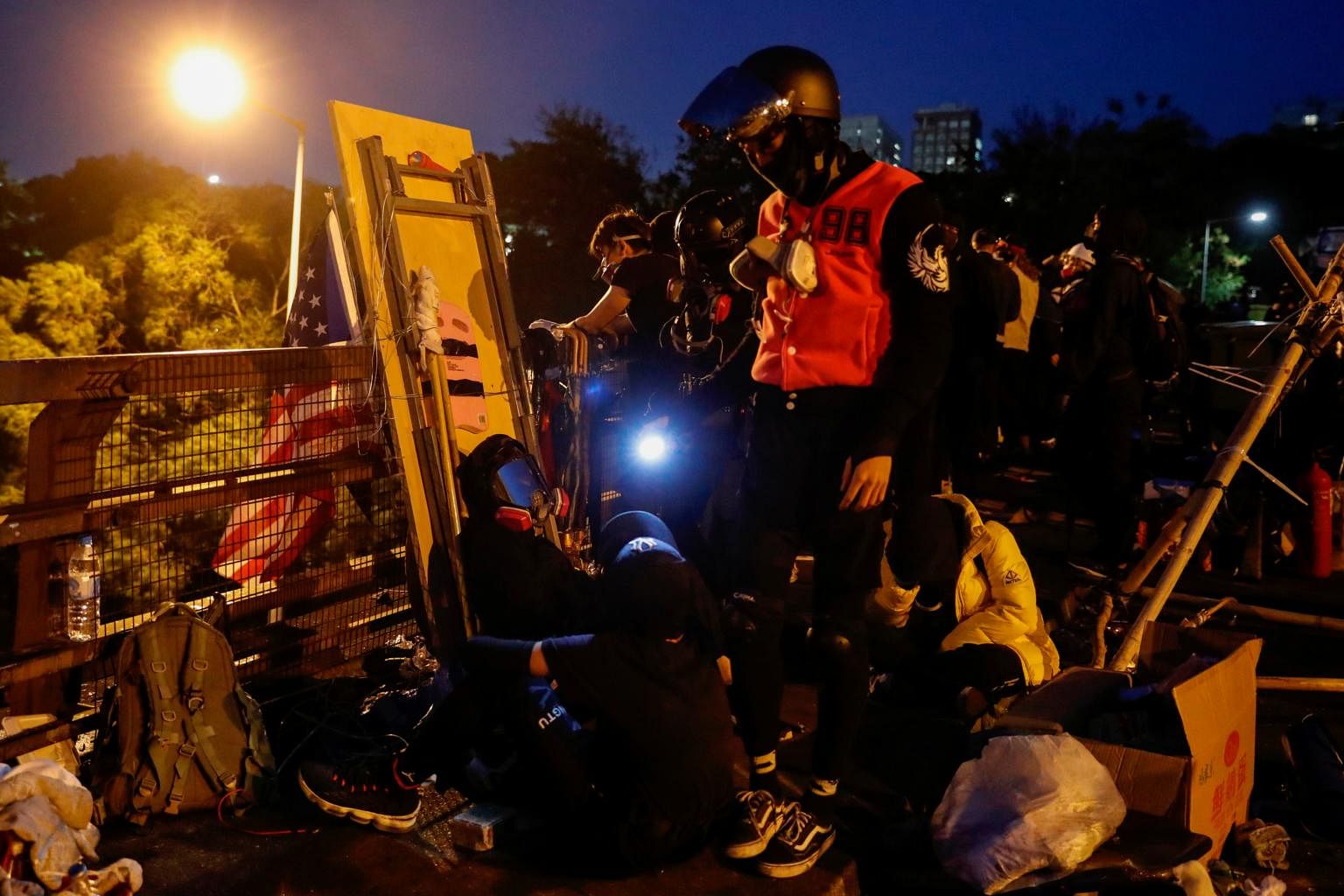
"There has been a gradual escalation," said Mr Joseph Cheng, a retired political science professor and pro-democracy activist.
"But the mood so far is still very much against the government, and that explains why the disruptions on weekdays are still being tolerated."
The protests kicked off in June over opposition to legislation allowing extraditions to mainland China, and soon morphed into a wider movement about China's increasing grip on power. Though they started peacefully, protests have become increasingly violent in recent months, with no end in sight.
For now, the government is just trying to get life back to some semblance of normalcy in Hong Kong.
"We're moving from protests to cat-and-mouse, individual acts of violence," said Mr Kevin Lam from the Progressive Lawyers Group.
"That could well be where we're going with this, unless the government does something to defuse the situation. But it doesn't look like it's doing that."

